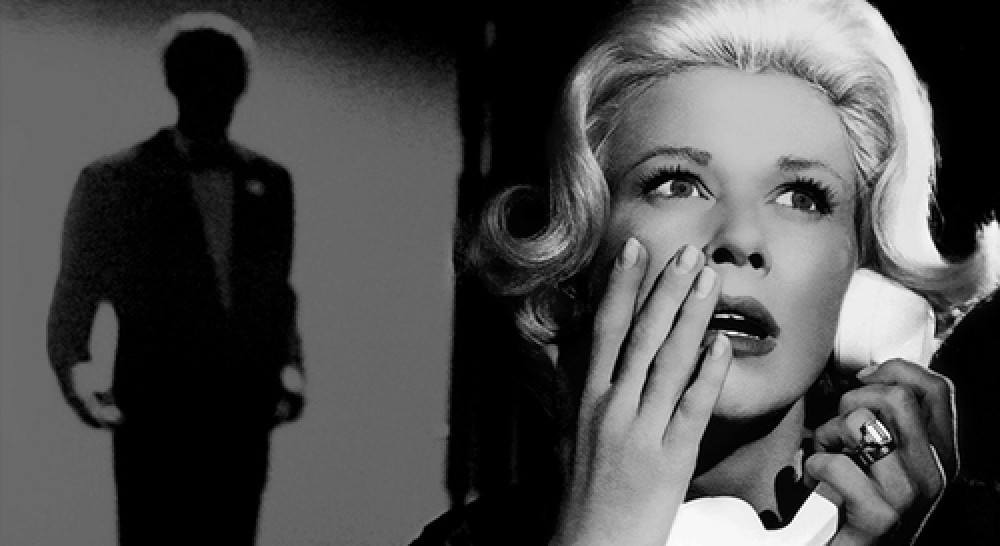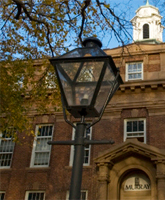Posted by Sarah
The discussion on Black Book ranged widely and encompassed: the film’s relationship to melodrama; the trope of the suffering woman; the family in melodrama; rhythm in melodrama and the film’s unending revelations of betrayals; the film’s characters Akkermans and Muntze; moral ambiguity; costume; women’s fluid identity/ies); melodrama and real life.
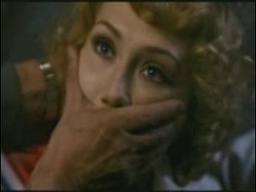 We began by isolating some of the elements which coincided with our understanding of melodrama. The continuous suffering of the main female character Rachel/Ellis (played by Carice van Houten) was especially noted. The group has commented on the suffering female(s) present in previous, and varied, screenings, including: D.W. Griffiths’ The Mothering Heart (1913), Gaslight (Thorold Dickinson 1940, George Cukor 1944), Douglas Sirk’s Magnificent Obsession (1954), Twin Peaks (TV 1990-1991), and David Lynch’s Mulholland Drive (2001).
We began by isolating some of the elements which coincided with our understanding of melodrama. The continuous suffering of the main female character Rachel/Ellis (played by Carice van Houten) was especially noted. The group has commented on the suffering female(s) present in previous, and varied, screenings, including: D.W. Griffiths’ The Mothering Heart (1913), Gaslight (Thorold Dickinson 1940, George Cukor 1944), Douglas Sirk’s Magnificent Obsession (1954), Twin Peaks (TV 1990-1991), and David Lynch’s Mulholland Drive (2001).
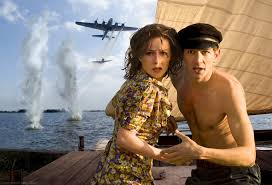 The film begins in 1950s Israel but soon a triggered memory causes it to flash back to Nazi-occupied Holland in 1944. At his time Jewish Rachel Stein is separated from her real family and finds shelter with a Christian family. Her relatively quiet existence is soon shattered as her hiding place is bombed when she is out, presumably along with its inhabitants. Rachel’s real family has been hiding elsewhere but soon they are reunited. This might at first appear coincidental (another important melodramatic trope which is also present elsewhere in the film) but is in fact explained away by a mutual acquaintance (her father’s solicitor Smaal) being aware of Rachel’s plans and informing her family. Almost immediately after the family reunion Rachel witnesses the slaughter of her mother, father and brother just when they, and other Jewish families, seemed on the road to freedom. After losing her surrogate family and home then, Rachel’s suffering is heightened, indeed overtaken, by the loss of her real family.
The film begins in 1950s Israel but soon a triggered memory causes it to flash back to Nazi-occupied Holland in 1944. At his time Jewish Rachel Stein is separated from her real family and finds shelter with a Christian family. Her relatively quiet existence is soon shattered as her hiding place is bombed when she is out, presumably along with its inhabitants. Rachel’s real family has been hiding elsewhere but soon they are reunited. This might at first appear coincidental (another important melodramatic trope which is also present elsewhere in the film) but is in fact explained away by a mutual acquaintance (her father’s solicitor Smaal) being aware of Rachel’s plans and informing her family. Almost immediately after the family reunion Rachel witnesses the slaughter of her mother, father and brother just when they, and other Jewish families, seemed on the road to freedom. After losing her surrogate family and home then, Rachel’s suffering is heightened, indeed overtaken, by the loss of her real family.
The family is often central to melodrama, and it is also the case here since it prompts Rachel’s later action, and she relives this particularly traumatic scene. On the first occasion this is implicit. In Rachel’s new, non-Jewish, identity of Ellis de Vries she has joined the Dutch resistance. These defend themselves against Nazi soldiers, gunning them down, and then stripping their bodies of useful uniforms. This reminds the viewer of the earlier scene since after the slaughter of the Jewish families the Nazi soldiers divest them of their jewellery. The connection is reinforced as Rachel/Ellis can only stand by as a mute witness as both events occur. Later on, a powerful reaction to again 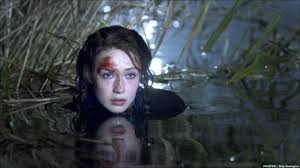 seeing the man who was responsible for Rachel/Ellis’ family’s slaughter is indicated not just physically (Rachel/Ellis runs to the cloakroom to vomit) but psychologically: the film provides a flashback of the earlier scene, from Rachel’s point of view.
seeing the man who was responsible for Rachel/Ellis’ family’s slaughter is indicated not just physically (Rachel/Ellis runs to the cloakroom to vomit) but psychologically: the film provides a flashback of the earlier scene, from Rachel’s point of view.
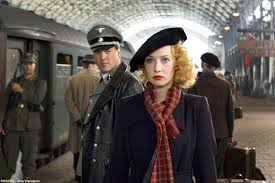 Rachel/Ellis’ suffering is not confined to these awful events, however. She suffers more as she witnesses some of her new friends being caught by the secret police. Rachel/Ellis also suffers conflict by falling in love with the high-ranking Nazi official, Ludwig Muntze (played by Sebastian Koch), she has been sent to spy on after meeting him, by chance, on a train and charming him. Tellingly the first scene of their lovemaking is accompanied not by a lush romantic score, but one more indicative of danger, danger Rachel/Ellis (and to an extent) Muntze, cannot for a moment disregard. Rachel/Ellis later suffers as Muntze is arrested and sentenced to death, and she is imprisoned after a botched attempt to rescue him. Another Nazi official, Gunther Franken (played by Waldemar Kobus), inflicts further suffering as he leads stages a scene within the hearing of a ‘secret’ microphone Ellis previously hid. This leads Rachel/Ellis’ friends to think she has betrayed them, and is a further level of suffering: others’ belief in her good character is taken from her. Rachel/Ellis and Muntze later escape together, enjoy a few moments of rare domestic bliss on a boat, but are captured after confronting Rachel/Ellis’ father’s solicitor Smaal with suspicions of corruption. Franken’s destruction of Ellis’ good name has practical consequences too. After peace has been declared she is rounded up with other traitors and detained, beaten and humiliated. Finally she hears that her lover Muntze has been killed. This is tellingly the moment at which she actually lets her emotions out, collapsing to the floor, sobbing uncontrollably and rhetorically asking ‘when does it end?’ Even the film’s conclusion, which returns to a time in the 1950s just after Rachel’s flashback has begun, follows the pattern of a momentary respite before suffering again intrudes. After a brief happy moment with her husband and children we can see that another war rages around them.
Rachel/Ellis’ suffering is not confined to these awful events, however. She suffers more as she witnesses some of her new friends being caught by the secret police. Rachel/Ellis also suffers conflict by falling in love with the high-ranking Nazi official, Ludwig Muntze (played by Sebastian Koch), she has been sent to spy on after meeting him, by chance, on a train and charming him. Tellingly the first scene of their lovemaking is accompanied not by a lush romantic score, but one more indicative of danger, danger Rachel/Ellis (and to an extent) Muntze, cannot for a moment disregard. Rachel/Ellis later suffers as Muntze is arrested and sentenced to death, and she is imprisoned after a botched attempt to rescue him. Another Nazi official, Gunther Franken (played by Waldemar Kobus), inflicts further suffering as he leads stages a scene within the hearing of a ‘secret’ microphone Ellis previously hid. This leads Rachel/Ellis’ friends to think she has betrayed them, and is a further level of suffering: others’ belief in her good character is taken from her. Rachel/Ellis and Muntze later escape together, enjoy a few moments of rare domestic bliss on a boat, but are captured after confronting Rachel/Ellis’ father’s solicitor Smaal with suspicions of corruption. Franken’s destruction of Ellis’ good name has practical consequences too. After peace has been declared she is rounded up with other traitors and detained, beaten and humiliated. Finally she hears that her lover Muntze has been killed. This is tellingly the moment at which she actually lets her emotions out, collapsing to the floor, sobbing uncontrollably and rhetorically asking ‘when does it end?’ Even the film’s conclusion, which returns to a time in the 1950s just after Rachel’s flashback has begun, follows the pattern of a momentary respite before suffering again intrudes. After a brief happy moment with her husband and children we can see that another war rages around them.
We thought that Rachel/Ellis’ continual suffering fitted Matt Buckley’s description of melodrama’s often relentless ‘rhythm’ when he gave a research talk the other week. Further relation to earlier theatrical melodrama, specifically Victorian, was suggested as the ‘Jerries’ were a force outside of the characters’ control, much like fate. The film’s numerous false reveals of the person who betrayed the whereabouts of the Jewish families can also be seen to be connected to the notion of rhythm. First the ‘friendly’ secret policeman Van Gein is suspected. While he is indeed revealed to be working with the Nazis, he is not the traitor. Next Rachel/Ellis’ father’s solicitor Smaal is accused. He and his wife are immediately killed however, with Muntze chasing after the offender, but only 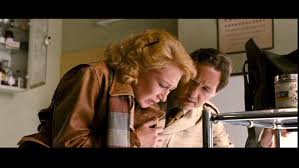 succeeding in being caught himself. Finally Hans Akkermans (Thom Hoffman), a Doctor and key resistance figure, is unmasked as the man responsible. He foolishly does this himself after attempting to kill Rachel/Ellis with an injection of insulin, but not waiting for it to take full effect.
succeeding in being caught himself. Finally Hans Akkermans (Thom Hoffman), a Doctor and key resistance figure, is unmasked as the man responsible. He foolishly does this himself after attempting to kill Rachel/Ellis with an injection of insulin, but not waiting for it to take full effect.
The scene ends when 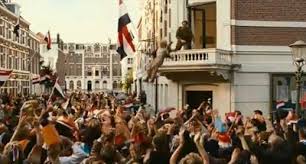 Rachel/Ellis manages to grasp some chocolate which rather ironically Akkermans had earlier given her and is able to reverse the effects of the insulin. She then, somewhat implausibly, escapes by rushing past Akkermans who is addressing the crowd from his balcony, and throwing herself into the mob below. (On a side note we also found the ambiguity of Rachel/Ellis’ motives here intriguing: was she bent on survival or destruction?) Nearer the film’s beginning Rachel/Ellis had told Akkermans that a friend of hers used to eat chocolate when he had over-injected with insulin. This is an example of the film’s fairly-heavy handed use of foreshadowing. Another key example occurs in relation to Akkermans. Earlier in the film Akkermans, to the delight of his resistance colleagues, mocks Hitler by donning a makeshift toothbrush moustache and speaking in a mock-German accent. Now he is indeed corrupted by power, with a very high opinion of himself, and is addressing the crowd as a leader might.
Rachel/Ellis manages to grasp some chocolate which rather ironically Akkermans had earlier given her and is able to reverse the effects of the insulin. She then, somewhat implausibly, escapes by rushing past Akkermans who is addressing the crowd from his balcony, and throwing herself into the mob below. (On a side note we also found the ambiguity of Rachel/Ellis’ motives here intriguing: was she bent on survival or destruction?) Nearer the film’s beginning Rachel/Ellis had told Akkermans that a friend of hers used to eat chocolate when he had over-injected with insulin. This is an example of the film’s fairly-heavy handed use of foreshadowing. Another key example occurs in relation to Akkermans. Earlier in the film Akkermans, to the delight of his resistance colleagues, mocks Hitler by donning a makeshift toothbrush moustache and speaking in a mock-German accent. Now he is indeed corrupted by power, with a very high opinion of himself, and is addressing the crowd as a leader might.
Akkermans is certainly a complex character. Some of this is linked to narrative necessity – he must appear one thing while actually being another, and do so convincingly as the film works its way through unmasking its variety of different ‘villains’. This leads to perceived emotional complexity – has he always been corrupt, or been made corrupt through necessity and/or power? We found the character of Muntze more interesting, however. Although a high-ranking Nazi official he is even less the wholly bad villain of melodrama. Muntze is redeemed by the film in several ways. The first of these, which ties him closely to Rachel/Ellis, is that he too has been affected by the loss of his family. His wife and children were bombed by the British. The film also shows Muntze attempting to institute a ceasefire with the resistance. Furthermore, he does not betray Rachel/Ellis to the authorities when she confesses her true identity and purpose.
It was also commented upon that the actor playing the ‘nice’ Nazi Muntze (Sebastian Koch) was attractive, while the actor playing the ‘nasty’ Nazi Franken (Waldemar Kobus) was less easy on the eye. This led to further discussion about the ambiguity of the film’s, and its characters’, morality. The way in which those thought to have betrayed their country by collaborating with the Nazis were treated – Rachel/Ellis’ and others’ humiliation – was lingered on by the film, rather than evaded. Some in the group wanted Rachel/Ellis and Gerben Kuipers (a resistance man who had lost his son because of Akkermans’ betrayal) to take the moral high ground after they had tracked him down. Instead, Rachel/Ellis used the point of her locket containing family pictures to screw down his coffin lid in order to suffocate him – a poetic revenge. Rachel/Ellis and Kuipers discuss the fact that they should let Akkermans live. Neither does, despite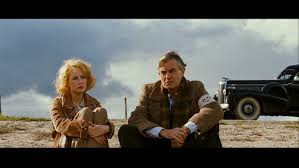 Rachel/Ellis’ earlier agreement with Smaal that everyone is entitled to a fair trial. One of them notes that Hans has gone quiet and we might presume he has died. It was thought that some uncertainty, however, allowed Rachel/Ellis and Kuipers some moral leeway.
Rachel/Ellis’ earlier agreement with Smaal that everyone is entitled to a fair trial. One of them notes that Hans has gone quiet and we might presume he has died. It was thought that some uncertainty, however, allowed Rachel/Ellis and Kuipers some moral leeway.
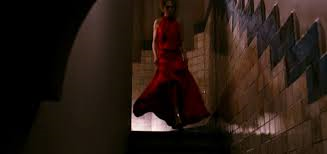 Costume also featured in our discussion. We questioned the historical accuracy of some of the outfits, especially the women’s. However of more concern to us was the symbolism of the costumes. The floor-length leather coasts and jack boots which singled out the most high-ranking officers are especially iconic and were easy to identify. In most cases their presence immediately signalled a character’s loyalties and standing, though Muntze was an exception. Rachel/Ellis’s costumes were of particular interest. It was telling that a few in the group who had seen the film before had misremembered the colour of a dress Rachel/Ellis wears at one point. Rachel/Ellis leaves a party she is attending to crawl though the coal store and allow her comrades access to the Nazi’s underground prison. The dress she wears was remembered by some as being white, though it was in fact red. It was thought that this was because white is linked to notions of innocence and that is how we view Rachel/Ellis. The red dress of course has other connotations – to do with passion, desire and sex. This led to further discussion of women’s costumes. We especially noted that Rachel/Ellis and her fellow worker Ronnie use clothing as part of the wiles they rely on to survive from day to day. Rachel/Ellis’ decision to wear to work a see-through blouse which revealed her underwear highlighted this. We further noted the fluid identity of these two main female characters – they have to morph and adapt. Ronnie was very interesting in this regard
Costume also featured in our discussion. We questioned the historical accuracy of some of the outfits, especially the women’s. However of more concern to us was the symbolism of the costumes. The floor-length leather coasts and jack boots which singled out the most high-ranking officers are especially iconic and were easy to identify. In most cases their presence immediately signalled a character’s loyalties and standing, though Muntze was an exception. Rachel/Ellis’s costumes were of particular interest. It was telling that a few in the group who had seen the film before had misremembered the colour of a dress Rachel/Ellis wears at one point. Rachel/Ellis leaves a party she is attending to crawl though the coal store and allow her comrades access to the Nazi’s underground prison. The dress she wears was remembered by some as being white, though it was in fact red. It was thought that this was because white is linked to notions of innocence and that is how we view Rachel/Ellis. The red dress of course has other connotations – to do with passion, desire and sex. This led to further discussion of women’s costumes. We especially noted that Rachel/Ellis and her fellow worker Ronnie use clothing as part of the wiles they rely on to survive from day to day. Rachel/Ellis’ decision to wear to work a see-through blouse which revealed her underwear highlighted this. We further noted the fluid identity of these two main female characters – they have to morph and adapt. Ronnie was very interesting in this regard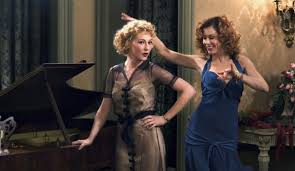 as she was revealed to be more scheming than we might have been anticipated: she affects Rachel/Ellis’ and Muntze’s joint escape from prison. We wanted to know more about her, especially as her presence in Israel and recognition of Rachel/Ellis sparked the film’s extended flash back. What was Ronnie’s story?
as she was revealed to be more scheming than we might have been anticipated: she affects Rachel/Ellis’ and Muntze’s joint escape from prison. We wanted to know more about her, especially as her presence in Israel and recognition of Rachel/Ellis sparked the film’s extended flash back. What was Ronnie’s story?
Whose story is the film based on?’ was another question we asked. The opening credits assert that it is ‘based on a true story’. The film’s many coincidences and revelations may make this seem unlikely. But it chimes again with Matt Buckley’s recent talk. In this he emphasised the increasing relevance of melodrama not just to art, but to lived modern experience.
Many thanks to Tamar for choosing this rich film, especially apt due to the School of Arts upcoming trip to Amsterdam.
Do, as ever, log in to comment or email me on sp458@kent.ac.uk to add your thoughts
